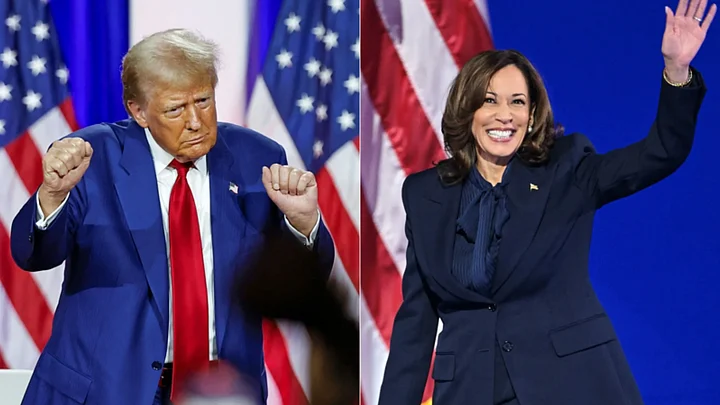With the counting of the votes underway, the 2024 race for the White House has the masses utterly divided. Nevertheless, the outcome of the US elections has an impact far beyond America.
As the world’s biggest economy and a global military and diplomatic player, the US significantly impacts countries worldwide. India, too, is no exception, and the elections in the US carry consequential implications for New Delhi, given the close ties it has had with Washington since the dawn of this century.
India would be significantly impacted by the possible paths of a Trump or Harris presidency, which would change the nature of defence, economic and diplomatic relations between the two biggest democracies in the world.
Under these leaders, the relationship is likely to develop differently, each representing distinct policy priorities.
Trump vs Harris
A Trump administration, motivated by economic pragmatism and a resolute "America First" stance, would probably prioritise transactional diplomacy and strengthen bilateralism. This might entail tougher immigration laws, an emphasis on defence accords, and potential conflict over trade imbalances for India. Trump's combative approach to China may offer India both advantages and disadvantages.
As a vital Indo-Pacific ally, India may benefit from stronger strategic connections with the United States, but this could come at the expense of regional tensions or economic dependence.
On the other hand, a Harris government might situate India in an international framework that prioritises human rights, climate change, and democratic partnerships. Through promoting cultural exchange and collaboration in technology and education, Harris's ties to the Indian diaspora may help advance soft power diplomacy. However, this emphasis on democratic principles may also result in increased American scrutiny of India's internal policies, particularly about matters like minority rights and press freedom. Despite their differences, both routes would impact India's foreign policy decisions in a world that is becoming increasingly polarised.
Trump's "America First" stance strained relations with India, especially in commerce. He saw the trade relationship as uneven and regularly criticised India's high tariffs on American commodities, such as agricultural products and Harley-Davidson motorcycles. His administration ended preferential trade terms for billions of dollars' worth of Indian exports to the United States in 2019 when it kicked India out of the Generalised System of Preferences (GSP). Both countries persisted in trade negotiations during his presidency to prevent trade conflicts from overshadowing their larger strategic objectives, attempting to settle tariff disputes and enhance market access.
In the context of trade with India, Harris is most likely to toe the line of Biden’s trade policy. The Biden administration has maintained the majority of the tariffs imposed by the Trump administration. He, in fact, increased tariffs on semiconductors and electric vehicles from China this May. Moreover, Harris would more likely be in favour of multilateral trade agreements and other regional arrangements.
India was also affected by Trump's immigration policy, especially the tightening of the H-1B visa program, which is essential for India's IT workers in the United States. The government cited the need to safeguard American workers, and this made India's IT industry and its commercial relations with the United States more complex. On the other hand, Harris’ support for merit and skill-based immigration is one of the brighter spots for Indian IT professionals, thus paving the way for expansion in the H-1B visa program.
As tensions escalated between India and China, particularly along the Line of Actual Control (LAC) in 2020, Trump's administration openly supported India’s position. This alignment reinforced the narrative of India as a critical player in the Indo-Pacific, and Trump’s vocal criticism of China created a shared strategic interest in countering Beijing's aggressive postures.
On the other hand, a Harris win would signify a renewed focus on countering Chinese aggressiveness in the South China Sea through FONOPs (Freedom of Navigation Operations). Both Trump and Harris are almost on the same page on China. However, Harris is not in favour of a trade war with China.
During her 2022 meeting with Chinese President Xi Jinping, Harris highlighted the need for dialogue between their nations to manage the competition. A Harris administration would be willing to work together with allies in evolving its trade policy towards China.
Indeed, a Harris Presidency would largely be a reflection of the Biden administration in many ways since she was a part of it. However, she maintains that she is neither Trump nor Biden.
For both countries, there are more points of convergence than divergences. There is an unmistakable continuity in the bolstering of the relationship across a string of Republican and Democratic presidents in the last two decades. Regardless of who finishes first in the race to the White House, India-US ties can be expected to keep an upstream trajectory.
(Anurag Mishra and Prerona Baruah are PhD candidates at the United States Studies Department, School of International Studies, Jawaharlal Nehru University, New Delhi. Views are personal.)
(At The Quint, we question everything. Play an active role in shaping our journalism by becoming a member today.)
